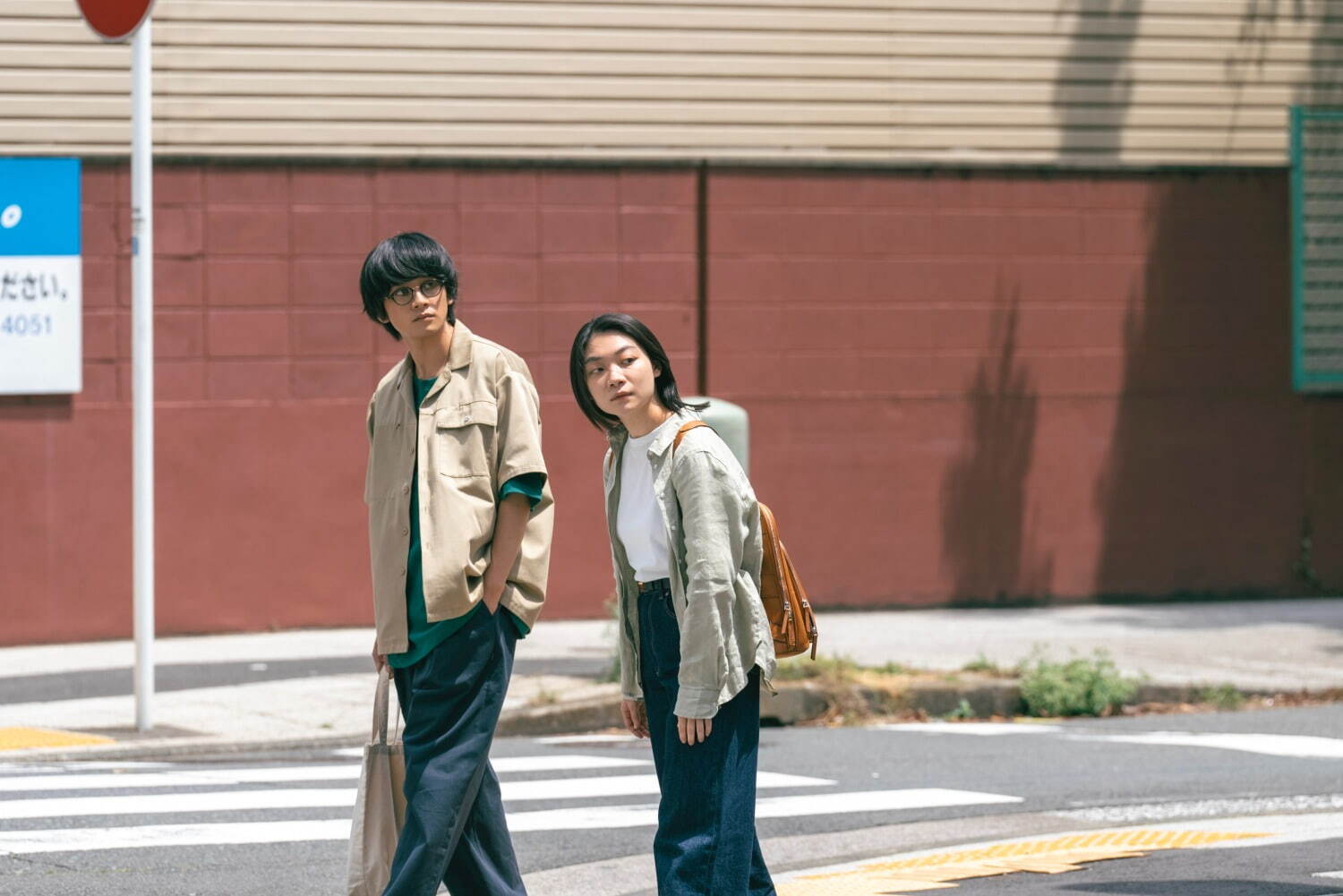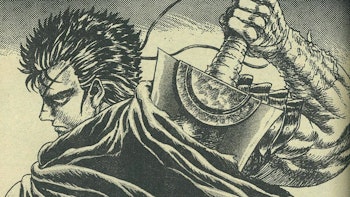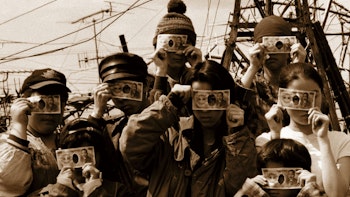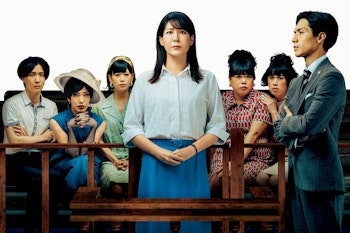
I Am What I Am (Japanese title: Sobakasu) is a movie about acceptance beyond the norm, and it’s not just Pride Month that has kept this film at the recent forefront of my mind. Shinya Tamada’s film directly challenges many of the conventions and expectations of Japanese society, the familial pressure to cultivate heterosexual relationships, through a central protagonist whose asexuality and lack of desire for romantic affection stand at odds with what co-workers and even her own mother think is best for her in the future.
Kasumi is an independent and single woman with little interest in finding love. After her sister gets married, her mother begins to pressure her into settling down now she’s approaching 30 years old. Unwittingly, she even goes as far as to arrange a marriage appointment with a friend and their unmarried son in the hope of instigating a connection, just one of many ways Kasumi is forced to navigate a sexual world that she is unwilling to be a part of.
Even as many ideas about gender roles and relationships have been challenged within Japanese society, generational differences and the lingering societal norms that even those who disagree may subconsciously wish to conform to can feel isolating for those who stand beyond the norms of heteronormativity. It’s true that a majority support same-sex marriage and that almost all prefectures and local governments have some form of partnership system in lieu of nationwide same-sex marriage legislation.
Yet even as younger generations are more likely to identify as LGBTQ+, as workplaces offer more support to queer couples and employees, and even as the situation slowly improves for women in the workplace with fewer expectations to quit upon marriage, it hasn’t changed the fact that differential treatment for those who break with societal expectations, whether that be for their identity or for things such as refusing marriage, remains a persistent issue.
Which is the situation faced by Kasumi in this film. Her sister gets married, and her mother with the good intentions of wanting their child to be happy without listening or understanding what they truly wants, tries to step in to help them find a partner. She sends her daughter into a marriage consultation without her being aware in advance of what was actually about to happen, in the hope of forcing something to happen. Luckily for her the person she meets isn’t necessarily seeking out marriage either, more friendship.

Kasumi is the heart of this film, an empathetic and observant character whose rebellion against what those closest wish for her future comes not in brash statements but silent refusal and self-assured contentment for her sense of self. It ironically makes her a more powerful agent to tell this story as someone who not only breaks the expectations of her set by family and friends, but of a genre that often relies on grand proclamations and melodrama to sell these stories of self-discovery to themselves and the audience.
Much of the praise for this must be directed towards Toko Miura, who took on the starring role coming off the back of a breakout performance in Ryusuke Hamaguchi’s Oscar-winning Drive My Car. There’s certainly similarities between the driver she plays in that film and the more brooding Kasumi, but there’s a depth and complexity in the ways in which she reacts to each situation. In scenes where the pressure of marriage is forced upon her we see her grow irritated or distant, while moments she spends alone such as on the beach feel like a chance to self-regulate and reset in realistic and relatable ways.
This portrayal is what allows the rest of this story to build from it. With Kasumi standing as an outcast, she’s both confused yet hyper-aware of how she is judged, playing into the episodic-like journey through life we are treated to throughout the film’s runtime. For the man she is unwittingly matched with, she continues to form a friendship because of the lack of a romantic intent behind their actions, at least at first. For her, considering the way in which even their meeting was forced upon both, a chance to get a reprieve under the guise of acting ‘properly’ is liberating.

When her friend, Maho Yonaga (Atsuko Maeda), returns to Shizuoka following time in Tokyo, she forms an instant reconnection in their shared shunning of the shackles of what others desire from them. This friend had spent their years in Tokyo working as an AV actress, a job that has forced them to develop a thick skin and care little for appearing outspoken in the face of the opinions of others. Recognizing what it can be like outside of heteronormative relationships is gay coworker Tsuyoshi Yashiro (Ko Maehara). Each stand in as proof of age as a factor for how things change, and even as they may not entirely understand Kasumi’s specific experiences, they at least are willing to support them. In episodes of their conversations and the flashpoints of daily life, they contextualize the world around our protagonist well.
I Am What I Am can sometimes feel like it seeks drama to break through some of the slow-paced melancholy, even when it isn’t necessary. While it starts off as friendship, there’s a pained inevitability to the fact that friendship develops to romance that serves a point in showing the difficulties in engaging with a world where opposite-sex relations can feel pressured to become romantic, especially if other forces set up the initial meeting to insinuate such a relationship. That being said, the way this shift occurs has an air of melodrama that feels distracting from the more level-headed and frank nature it handles navigating such a world for Kasumi.
It’s the only downside in a film that otherwise provides a rare and nuanced exploration of what it means to be disinterested in love and sex in a society where norms of marriage and love are so heavily ingrained into the national and family dynamic. From the opening scene where we see how uncomfortable the supposedly ‘complimentary’ flirting from strangers at an izakaya makes her feel, the film considers how what we accept as normal can be seen differently based on varied perspectives.

Scenes creating a Cinderella story for a daycare that doesn’t end with Prince Charming getting married is an understandable rebuke for Kasumi, but shows the contradictions of the opinions of society when, even in a country beginning to embrace more diverse expressions of family and gender roles, ideas of cishet marriage and procreation are ingrained to the point of rebuke if you insinuate otherwise.
Stay in your lane, or the nail that sticks out gets hammered down.
Even in Japan’s growing library of queer cinema or those with reputation of diverse genders and relationships, asexuality is not common. It’s not common elsewhere, which is what makes this film worth highlighting. It’s not just a case for strong representation but for varied perspectives on the world. I Am What I Am is made with empathy, and does so while remaining ultimately rather mundane in a way that’s refreshing for this sort of story. It’s seeking to highlight a perspective as opposed to solving it, but you see Kasumi’s life change even a little by seeing her life in this film.
It’s also worth handling highlighting at a time where Tamada’s latest film is set to grace Japanese cinemas after claiming the top prize for best feature film at the prestigious Shanghai International Film Festival. I Am What I Am leaves me with strong hopes for On Summer Sand, in the hope that film’s views on grief can be as nuanced as what we see here.
Japanese Movie Spotlight is a monthly column highlighting new Japanese cinema releases. You can check out the full archive of the column over on Letterboxd.










